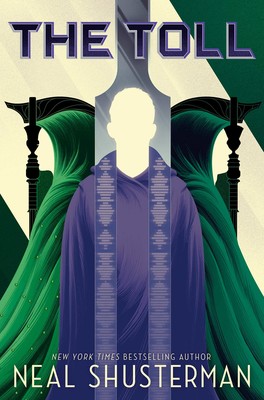If you read my Scythe review, you’ll know that the first book in Neal Shusterman’s Arc of a Scythe trilogy entranced and intrigued me. Thunderhead, the second book (not reviewed on the Forum), raised the bar even higher. I had perhaps too great hopes for the third book, The Toll.
It isn’t nearly as shameless as the screen-craving Hunger Games atrocities, but in places it looks like a bad college essay written the night before it’s due, trying to disguise its tardiness by flaunting disproportionately big (and sometimes misused) vocabulary in the middle of grade school level sentences. (My apologies to grade-schoolers everywhere. You can do great things with words. Be precise and remember that words have meaning.)
Action! Substance and Plot Missing…
The Toll also employs set action pieces—far too typical of Y.A. fiction—designed to provoke that sweet snap of adrenaline rather than inspire a lasting personal connection with the characters. To be fair, Shusterman attempts to alternate between catering to adrenaline junkies and proposing a genuine connection. So whichever you’re looking for, you’ll get it every now and then. I got the sense, certainly influenced by my opinion of the first two books, that Shusterman is better than this book suggests. One admirable device that hints at the end, without spoiling it, is Shusterman’s use of fictional scholarship, written in a time far in the future of the events of the book, which provides insights into the present characters and story, as well as the way we think about the past.
Clichéd Characters
The characters have, for the most part, lost their ability to touch and move us. The story of Rowan and Citra, once promising, turns into predictable cliches: star-crossed lovers are torn apart, agonize very properly, and are still very correctly in love at the end. Their best moment, a touching resurrection, comes early on and is by itself a satisfying resolution of their suspended fate in the second book. SPOILER and cheap joke alert: one wishes that that moment had been frozen in time.
The main villain’s evil plot to take over the world is likewise predictable. If you recognize the origin of his Scythe name, uncovering both his plot and the Thunderhead’s is like pulling a blanket off an empty table: easy, quick, and disappointing. He monologues at the appropriate moments, arrives just too late as a matter of course, and remains dutifully ineffective throughout.
The new character Jerico Soberanis, remarkable for a kind of personal transformation dependent on his geographical situation and the weather, is otherwise unremarkable, a plot device for furthering the underlying story of the Thunderhead, or any other characters, as needed. The continued story of Greyson Tolliver, who has become The Toll, the sole remaining link between the Thunderhead and humanity, is more compelling. But as with Jerico, this is mostly because of his unique relationship, alternately sparring and affectionate, with the elusive A.I.
A.I. Interrupted
Speaking of which, the story of the Thunderhead, the artificial intelligence that smoothly and kindly operates the earth, continues to intrigue. This A.I. is not Hal, definitely not Skynet or Agent Smith, and not exactly J.A.R.V.I.S. or an Asimov creation, but is a little bit of each and something more. In my customary nerdy and pretentious way, I’d describe the Thunderhead as an entity born of a marriage between Jane (Ender series) and a sarcasm-free cousin of Deep Thought (Hitchhiker series). The Thunderhead’s internal conflict, and its genuine attempts to be benevolent while seeking personal growth, make up the most interesting threads in the aforementioned disappointing blanket. The Toll is almost worth reading just for that story arc, but readers would do just as well stopping at the cathartic end of Thunderhead, the second book of the trilogy.
Poorly Written Screenplay?
Racing toward its inevitable conclusions, avariciously licking its lips over its big-screen revenue potential, The Toll tries to get every possible reader on its team. It panders to the so-called “right” with artificial nostalgia, trumpeted references to classic literary works, and misplaced disorganized allusions to liturgical ritual. It then turns around and panders to the so-called “left” by crusading for contemporary social causes. For the politically disinclined and 60’s rock aficionados, Shusterman also gives some love to Jim Morrison, but the relevant character was still fun, did have some development, and held a fitting place in the story.
Self-identifying conservatives almost certainly will disapprove of this book, self-identifying liberals almost certainly will approve of it, and the iGen for whom its screen production is intended probably will be ambiguously receptive. Apologies to the iGen from a bombastic millennial. The bottom line is, after the energetic and thought-provoking brilliance of the first two works, this one burns through its capital as it blasts off, headed confidently for the not-too-distant movie deal.
Positive: You don’t have to read Hunger Games.
Negative: It isn’t Ender’s Game.*
Questions for Discussion
- How is this book different from the first two?
- The trilogy is called Arc of a Scythe. Who is the Scythe named in that title?
- Where does it seem more like a movie script and where more like a work of verbal imagery?
- To which characters do you personally connect, and why?
- Are the Scythes justified in their way of life? Consider the different motivations they have, including those of the founders.
* Qualifier: read the Heights Forum review of Ender’s Game. It has some relevant criticisms not to be taken lightly. Don’t read the Hunger Games under any circumstances. Brain cells will die.



